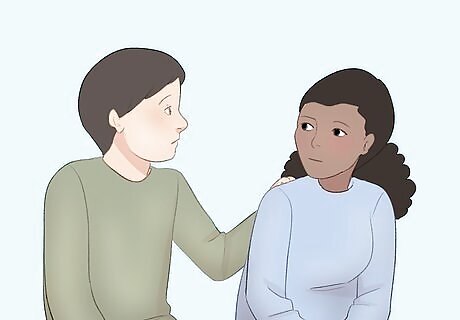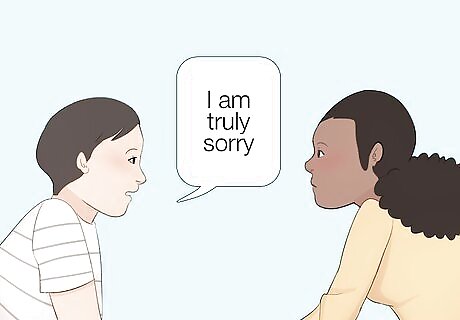
views
Keeping Calm and Humble

Keep your facial expressions neutral, but genuine. When apologizing, you are likely being very honest and humble. When that apology is not accepted, it might make you angry, causing your face to tense up or perhaps even turn red. Work to remain as calm as possible. Though it is okay to cry or to express sadness, do not beg, plead, or yell. Be genuine with what you are feeling, but do not let your apology be overcome with negative emotional outbursts. For instance, perhaps your boss rolls his eyes while you are apologizing for missing a deadline. Instead of furrowing your brows or rolling your eyes too, avoid over-the-top facial expressions, and continue with your sincere apology. Before delivering the apology, practice some self-soothing techniques so that you can be at peace. Consider meditating beforehand or saying a quick prayer.

Take a deep breath. When your apology is rejected, take a deep breath in through your nose and exhale slowly through your mouth. Do so until you feel calm and ready to either reopen the discussion or walk away. For instance, if your friend refuses your apology, you can practice deep breathing so that you don't react negatively to them. No need to breathe loudly as this can be perceived as aggressive. Make your breaths slow and steady.

Avoid the defensive. Though your feelings are likely hurt, avoid being defensive. Do not insult them just because they did not accept your apology; this will only make matters worse. If you can think of nothing positive to say, simply say “okay” and walk away. Avoid making comments like “Well, I didn't care if you accepted my apology, anyway” or “You were never a good friend to me.” Now is not the time for bickering. Try to accept the other person's response, even if it is not the one you want to hear.

Analyze possible solutions. In the moment, perhaps an apology is not the best way to mend an issue. Consider whether or not there are any fixes that you can employ. You can even try asking them if there is anything that you can do to fix the situation. Show that you're taking responsibility for your actions by thinking about ways in which you can correct your mistake in addition to or instead of an apology. For instance, if you knock someone's ice cream from their hand and say “sorry,” this might not be accepted. However, if you buy them a new ice cream, the issue can be quickly resolved.

Put yourself in their shoes. Before reacting negatively to having your apology rejected, take a moment to consider things from their perspective. Perhaps their refusal has nothing to do with you and is more about them having a bad day in general. Reflect on any observations that you've had of them that day that could indicate that other factors are at hand. Perhaps you accidentally made an error on a project and your coworker is upset. However, if earlier in the day, your boss yelled at them, this could be at the core of their bad mood. Remember, sometimes the other person might have had bad experiences in the past that hurt them. That could be a factor in why they don't accept your apology, even if what you did seems minor to you. Reconnect with them at a later time when they are in a better mood. There could be a number of reasons that they are not accepting your apology. Try not to take it personally, and come back later when things have cooled down.

Take a break. Sometimes, an apology has to happen at the right time in order for it to be well received. Now could be a bad time for the two of you. Let them know that you are going to step away from the situation for a bit, but that you will be speaking to them soon. Say something like “Hey, why don't we both take a few minutes and then reconnect later? I would really like to continue talking but want to clear my head for a bit.”
Apologizing a Second Time

Summarize what you did. When you reapproach them to offer a second apology, start by summarizing exactly what you did wrong. This will ensure that the two of you are on the same page and will help to fully clear the air. Say something like “Gia, I apologize for yelling at you the other day. I was angry and that is no excuse. I should never have raised my voice at you; I was completely out of line.”

Ask for clarification. After apologizing, make sure that there is nothing else that you have done that needs to be discussed. Your perception of the issue could be entirely different from theirs. For instance, you might think someone is mad because you yelled, but they really might be upset because you walked away from them afterwards when trying to speak to you. Say “Was there anything else that I did that bothered you? If so, I'd like for us to talk about it.”

Listen. Once you have spoken, give them time to speak. Truly listen to them; do not interrupt them or plan out your responses in your head while they are speaking. Try summarizing back what they have said to you to make sure they feel heard. For instance, you might say “So, it sounds like you're saying that I really bothered you when I cut you off in the meeting the other day because it made you feel unimportant. I'm sorry for that and I want you to know that I value all of your contributions to our team.”

Take responsibility for what you did. Never say things like “Well, I'm sorry for yelling BUT you made me mad.” Give your apology and leave it at that, with no exceptions or disclaimers. A half apology is no apology at all. Be open, honest, and genuine as well and don't preplan your words, but do some self reflection beforehand so you'll be ready.

Address your own concerns. After you have both spoken at length about your own missteps, take some time to discuss any issues that you may have had with them. Do not make up and issue or bring up something that was resolved from the past in order to make yourself feel better; only bring real concerns to the table for discussion. Try to avoid blaming them or being defensive. Simply explain your perspective. You might say something like “I am truly sorry for what I said to you, Brian. Sometimes, though, you try to one-up me. Or you brag about how much money you have when you know I'm going through a tough time, so that makes me feel like you're trying to make me jealous.” Use "I" statements to describe how you feel. For example, "I feel like sometimes I am not heard," is less combative than, "You never listen to me."
Moving Forward

Make a plan to avoid future hurt. After having a candid conversation, develop a plan, either together or separately, to avoid these problems. For instance, if they were mad at you for interrupting them in a meeting, then put forth an effort to be more patient and to be a better listener.

Give them space. The person you have wronged might need a bit of time to reflect on what happened as well as the apology. Give them that time. Don't blow their phone up continuing to ask for forgiveness; remember that you have already done that. You can check in every few days, if you haven't heard from them, but after a few weeks, avoid always being the first to reach out. Try saying something like, "I know you're still upset with me. I just want you to know that when you're ready to talk, I'm ready to listen, and I apologize again."

Don't burn bridges. Don't badmouth them or gossip about them to others, especially if you are coworkers. Be cordial when you see them and greet them with a “hello” and a smile. Though you might not be friends, you never know if you will need them in the future, so don't add any more problems to your dynamic.

Move on. At the end of the day, some people are simply unwilling to forgive, and they have that right. Avoid dwelling on the issue, especially if you have done what you can to make amends. Work to avoid making the same mistakes in the future and to create strong friendships and working relationships with others.




















Comments
0 comment